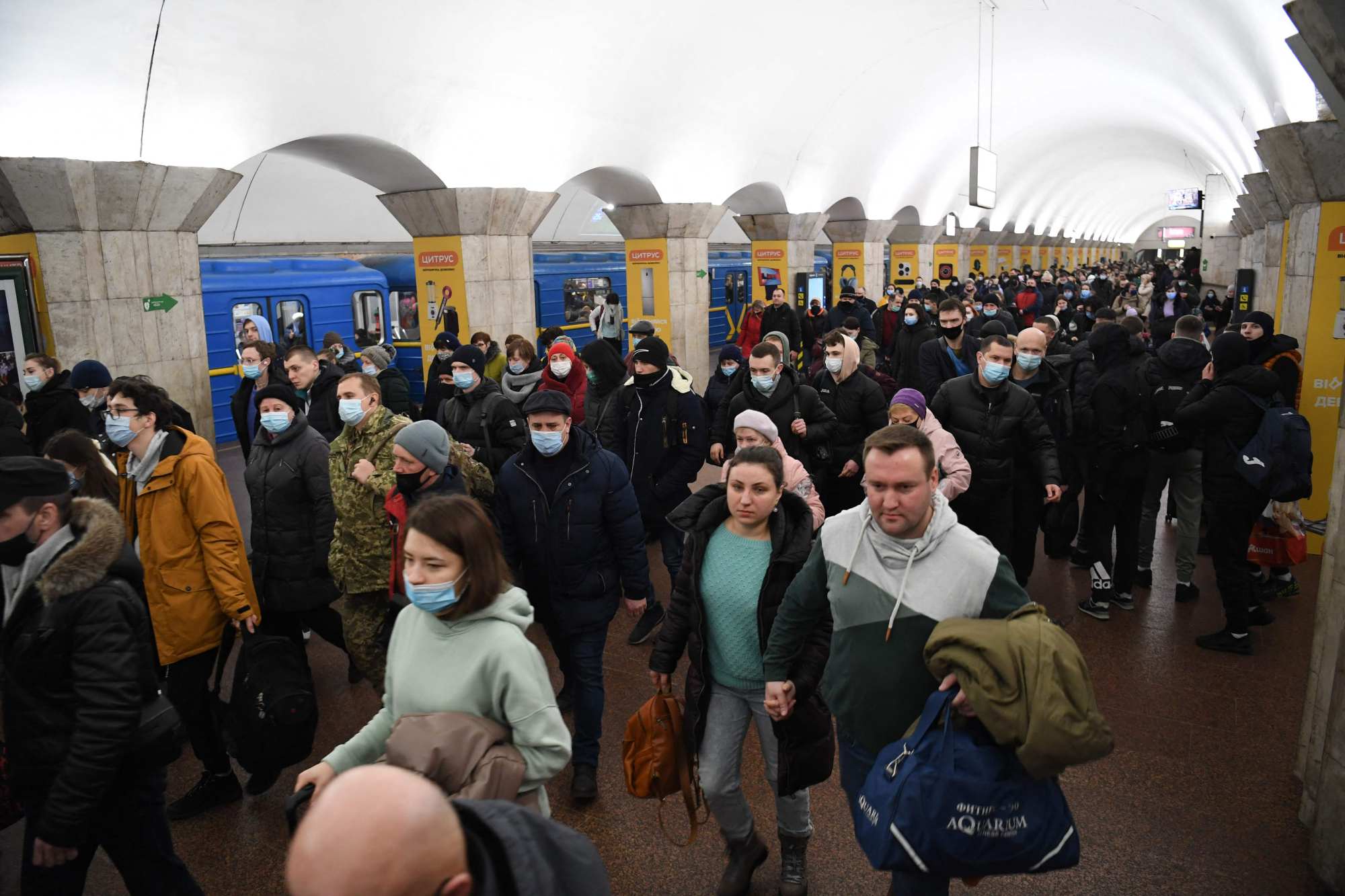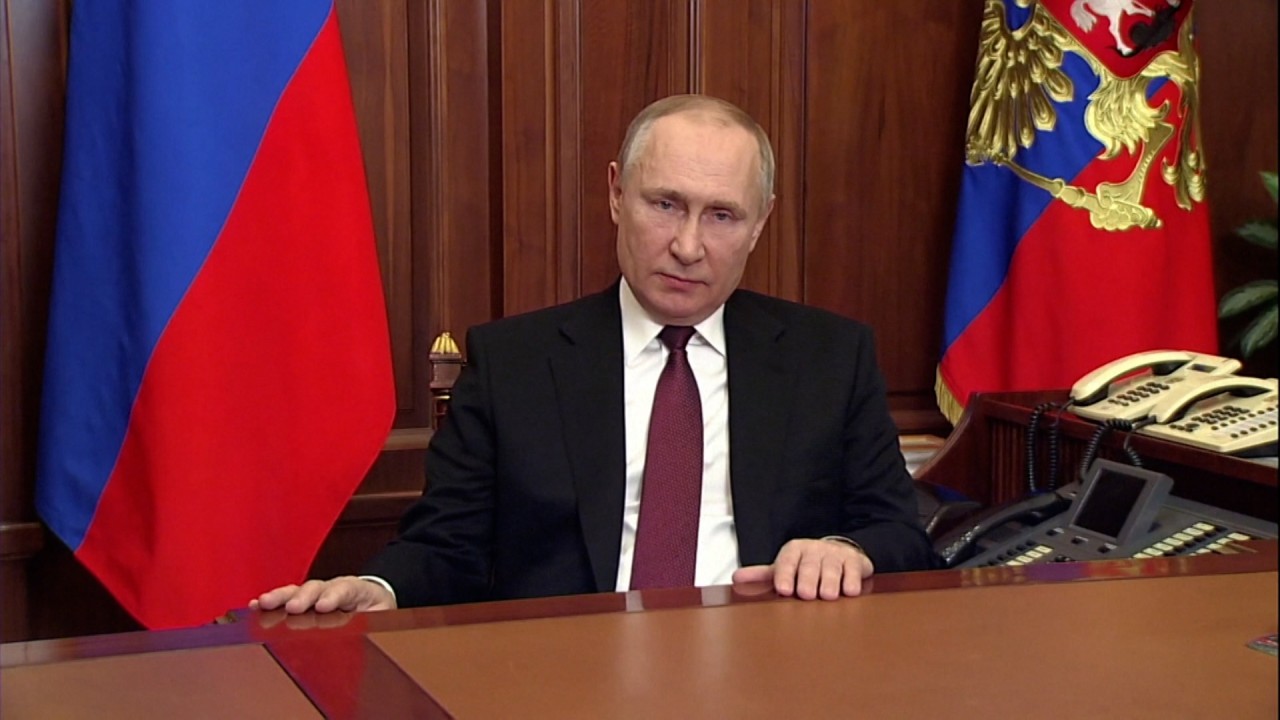
China seeks action to end rising Ukraine crisis as Putin gives order for military operation
- ‘We believe that the door to a peaceful solution to the Ukrainian issue is not completely closed and should not be closed’, says China’s envoy to the UN
- The US, European Union and Nato all condemned Russia while China’s foreign ministry said it was watching the situation closely
“The situation in Ukraine is at a critical moment and China is highly concerned about it … All parties concerned must exercise restraint and avoid further escalation of tensions. We believe that the door to a peaceful solution to the Ukrainian issue is not completely closed and should not be closed,” Zhang said.
“China calls on all parties to recognise the importance of implementing the principle of indivisible security, to continue to engage in dialogue and consultation and to seek reasonable solutions that address each other’s concerns through peaceful means, on the basis of equality and mutual respect.”
Chinese foreign ministry spokeswoman Hua Chunying later said, “China is closely watching the development and is urging all parties to exercise restraint to prevent the situation from getting out of control”.
Tensions over Ukraine escalated on Thursday as Putin said he had authorised a special operation in breakaway areas of eastern Ukraine and clashes between Russian and Ukrainian forces were only a matter of time.
“I have made the decision of a military operation,” he said in a surprise statement on television shortly before 6am Moscow time.
He went on to denounce what he called a “genocide” orchestrated by Ukraine in the country’s east and Nato’s aggressive policy towards Russia.
“For this, we will strive to achieve demilitarisation and denazification of Ukraine,” said Putin, promising to bring “to court those who have committed many crimes, responsible for the bloodshed of civilians, including Russian citizens”.
Russia’s Ukraine attack and the limits of China’s foreign policy
The United States and Nato condemned Russia’s action, and Ukraine’s Foreign Minister Dmytro Kuleba accused the Russian leader of launching a “full-scale invasion” as explosions were heard in cities around the country.
Ukraine’s Defence Minister Oleksii Reznikov said the world “must act immediately” with devastating sanctions on Russia, isolating Moscow by all means and providing assistance, including weapons, to Ukraine.
In a statement issued soon after Putin’s announcement, US President Joe Biden said the “world will hold Russia accountable” over its actions.
A statement by Ursula von der Leyen, President of the European Commission, and Charles Michel, President of the European Council, said they “condemn in the strongest possible terms Russia’s unprecedented military aggression against Ukraine”.
“By its unprovoked and unjustified military actions, Russia is grossly violating international law and undermining European and global security and stability. We deplore the loss of life and the human suffering,” the statement said.
“We call on Russia to immediately cease the hostilities, withdraw its military from Ukraine and fully respect Ukraine’s territorial integrity, sovereignty and independence. Such use of force and coercion has no place in the 21st century. The EU stands firmly by Ukraine and its people as they face this unparalleled crisis.”
The statement said the EU leaders would meet later today to discuss further restrictive measures that would “impose massive and severe consequences on Russia for its actions”.

China had earlier said Russia’s security concern – an objection to Nato accepting Ukraine – should be respected and understood. After Putin declared Donetsk and Luhansk as independent states, it said the security interest of all countries should be respected and protected.
Chinese diplomatic observers had said Beijing faced a dilemma over the Ukraine crisis because it needed to maintain good relations with Russia amid its rising confrontation with the US while finding it difficult to endorse Putin’s move.
Feng Yujun, vice-dean of international studies at Fudan University, said in an earlier interview with Phoenix TV that Russia was trying to take advantage of China-US confrontation to achieve its goal.
He said China needed to be aware that in the current crisis some countries wanted to achieve their geopolitical goals by subverting international order.
Timeline: Russia’s stand-off with Ukraine
The two nations said they opposed the expansion of Nato – a key Russian concern in the crisis with Ukraine – describing it as a cold war approach to international affairs.
Eagle Yin, a research fellow at the China Foundation for International and Strategic Studies in Beijing, said China’s emphasis on respecting all parties’ security concerns, meant regard for not only the Ukrainian side, but also the Russian, which he said had been ignored by Western countries for three decades since the collapse of former Soviet Union in 1991.
“Former Soviet president Mikhail Gorbachev and his US counterpart George H.W. Bush once reached a commitment after German reunification [in 1990], promising that Nato would not deploy any weapons to Germany after Russia withdrew all its troops from the region, and that none of the socialist countries would be allowed to join any military organisation,” Yin, said.
Yin said China shared concerns by Russia that it had asked to join Nato, but was rejected, and the eastward expansion of Nato was like “deploying cannons at Russia’s doorstep”.
Reports suggest Putin was rejected by Nato in 2000, 2004 and 2008, while for the first time Putin himself confirmed in his televised speech to the Russian people on Tuesday night that his approaches had been rebuffed.
“In 2000 when [US] President Bill Clinton was visiting Moscow … I asked him how America would see Russia joining Nato?” Putin said in the TV speech. “I would not give details … but the Americans ignored our demands and our concerns.”
“China doesn’t agree with Russia’s action in Ukraine, but Beijing understands Moscow’s reasonable demands and security concerns. That’s why China would not join the US to impose sanctions on Russia,” Yin said.
Shanghai-based military commentator Ni Lexiong said Russia’s invasion of Ukraine aimed to replicate its previous move to annex Crimea, as Putin attempted to start a “proxy war” in Ukraine to prevent direct armed conflict between Russia and Nato.
“Putin’s assertive move indicated he might expect the Biden administration would not deploy troops to help Ukraine because Kyiv is not yet a formal Nato member,” Ni said.
However, if the situation continued to escalate, it could turn into a world war, which would test the Chinese leadership’s political wisdom, Ni said.
“China will face a variety of choices once a war breaks out, but most importantly, Beijing should not stand on the losing side,” he said.
Additional reporting by Jun Mai





